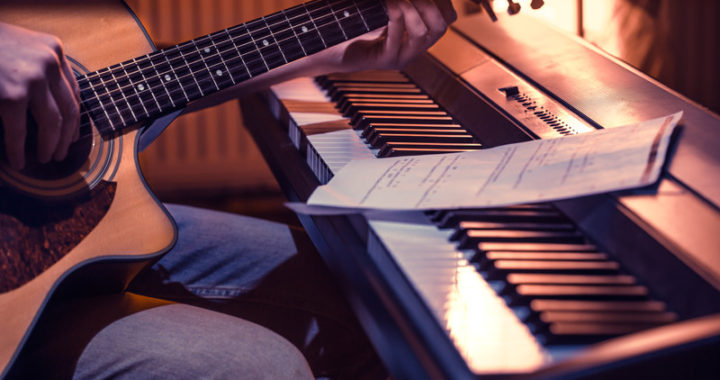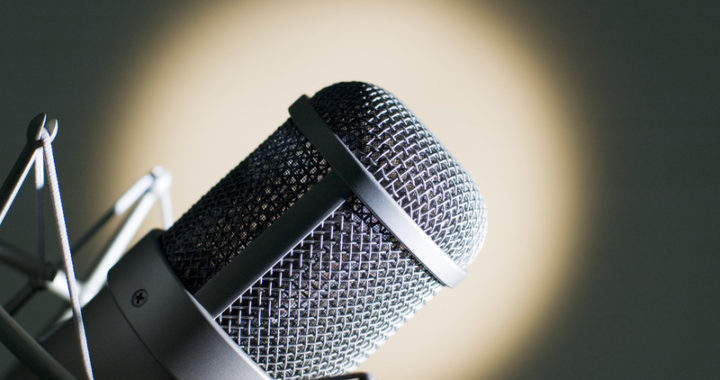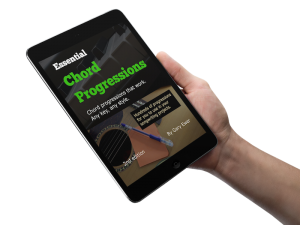The Essential Secrets of Songwriting Blog – Gary Ewer
-
What Should AI Mean to You as a Songwriter?
-
Being Prolific is Only Good If You’re Writing Good Songs
-
Why Developing a Diverse Songwriting Style is Crucial to Building a Larger Fan Base
-
Using the Range of Your Melody to Create Musical Energy
-
Don’t Ignore Your Playing When You’re Concentrating On Songwriting

What Should AI Mean to You as a Songwriter?
If you’re a songwriter and you’ve been paying attention to how AI has been impacting the world of music, you’re probably feeling more than a bit of anxiety. Things are changing quickly, and I think it’s definitely not an exaggeration to say that today’s AI generated songs and performances can fool a lot of (and maybe most) people.
There’s a good video online that describes the top ten AI songs — as of last year, which seems to be an eternity in this industry — that gives a good overview of how computers have become major players in today’s music world: “Top 10 AI Generated Songs“, by WatchMojo.com. It even mentions “Illiac Suite”, a computer-generated string quartet from 1957, which I’ve written about back in 2013 on this blog (‘What the “Illiac Suite” Taught Us About Music‘.)
With sites like Udio, Soundverse and others, “you” can create a song with a few taps of your finger, including lyrics and virtual performers. As I say, if you’re a songwriter, you might be feeling a bit of anxiety: it may take you a month to write your next song, but if the average listener can’t tell the difference between AI and you, does that hard work you put into your song actually matter anymore?
My answer is yes, it’s still worth writing songs the old-fashioned way, spending time honing your melodies, chord choices and lyrics. And perhaps at this point a good analogy from real life might help you keep things in perspective. When The Beatles made their first big impacts, especially with their albums Rubber Soul and Revolver, they caused other singer-songwriters to sit up and notice.
And feel what might called a kind of depression, a kind of “What’s the point?” It seemed that great songs were coming out of the brains of Lennon & McCartney (and then Harrison) with such ease that it made other songwriters feel that they were always a step behind.
But of course songwriters still kept writing. Because it doesn’t matter how good “A Day in the Life” is. “Bridge Over Troubled Water” is still a fantastic song. And the world is happily filled with great songs that had nothing to do with Lennon & McCartney, except that John and Paul’s music raised everyone’s game.
To answer the question What should AI mean to you as a songwriter, you have to ask yourself this more important question: Why are you writing songs in the first place?
If your primary reason for writing songs is to express yourself in an artistic way, to touch the hearts and minds of those who are listening, and to create something you might call a work of art, then AI should not be changing that at all. You can still write songs that are expressive, fulfilling, and effective.
I think AI is an amazing achievement. What it does well today is going to get better tomorrow. But in my opinion that should not at all mean that you should stop your own creative pursuits. Yes, it’s still worth working at becoming a better songwriter, a better musician.
Building your fanbase means increasing the number of people that want to hear you — your songs, your voice your artistic approach. And AI, no matter how good it gets, is never going to change that.
 Written by Gary Ewer. Follow Gary on Twitter.
Written by Gary Ewer. Follow Gary on Twitter.
 “The Essential Secrets of Songwriting” 10-eBook bundle comes with a free copy of “Use Your Words! Developing a Lyrics-First Songwriting Process”, along with an all-important Study Guide!
“The Essential Secrets of Songwriting” 10-eBook bundle comes with a free copy of “Use Your Words! Developing a Lyrics-First Songwriting Process”, along with an all-important Study Guide!

Being Prolific is Only Good If You’re Writing Good Songs
You may be the kind of songwriter that works slowly, such that by the end of the year you’ve only written a small handful of songs. It may be your norm to take your time getting your initial ideas down, and then spend a lot of time honing and crafting what you’ve written.
 Getting melodies and chords working well together is vital knowledge for any songwriter. “How to Harmonize a Melody” shows you, step by step, how that works, and gives you sound samples to follow.
Getting melodies and chords working well together is vital knowledge for any songwriter. “How to Harmonize a Melody” shows you, step by step, how that works, and gives you sound samples to follow.
If you find yourself worrying about the small number of songs you write compared to others who work in your genre, it’s worth reminding yourself of this important fact: No one will make note of how prolific you are if those songs aren’t good ones.
It’s like noting that a baseball player has played 3000 games in their career, but had only 200 runs batted in; the number of games becomes nothing more than an interesting but meaningless statistic.
But let’s say that your number of completed songs per year is bothering you, and you feel that you should be writing more. That can be a good objective. If the songs you’re writing seem to be good ones, popular with your fan base, and you simply wish you could write more, there may be things you can do to become more prolific. Here are some thoughts:
- Don’t overthink your songs. Sometimes you might find that you actually get a good number of songs written, but then it’s the editing stage where things get bogged down. Because for many, the editing stage becomes the “time to second-guess everything I’ve written” stage. If you find it easy to get into a flow, be more trusting that you’ve actually written something that works just as it is.
- Work on several songs at the same time. By this, I mean that you should hone your ability to keep several songs on the “front burner”, and switch to a different one as you feel ideas dwindle with the one you’re specifically working on. By doing this, you allow spontaneity to play a bigger role in your songwriting, rather than getting bogged down on one particular song.
- Work quickly. Historically we can see that songs that come together quickly have a level of excitement and raw musicality that serves as a kind of self-generating inspiration. Try to turn off your internal critic and get as much of a song written as you possibly can before putting the magnifying glass on what you’ve written. By doing this, you’ll probably find that you’re more pleased with what you’ve written, and songs become easier to edit.
- Work with others. Collaborations can be great ways to speed up the songwriting process, since the pool of ideas becomes larger and things can come together much quicker.
- Be more willing to explore non-conventions in your chosen genre. There’s a video of a Howard Stern interview of Billy Joel, in which Billy, in a way, pokes a bit of fun at how unconventional his hit “Piano Man” was: written in a 3/4 waltz time, with a lyric that’s actually a limerick. It’s the kind of thing that can make a songwriter worry and think that the song is weak. But as we know, “Piano Man” is a great song, and thankfully Billy didn’t overthink what he had written, and was willing to accept the song as being something unique, something actually powerful.
Most of the time, songwriters who worry about how much they’re writing are focussing on the wrong thing. You should be more focused on the quality of your writing. Once you feel that songwriting excellence is becoming more commonplace for you, you’ll probably find that the number of songs you write will naturally increase.
 Written by Gary Ewer. Follow Gary on Twitter.
Written by Gary Ewer. Follow Gary on Twitter.
 “The Essential Secrets of Songwriting” 10-eBook bundle includes several chord progression eBooks, including “Chord Progression Formulas”. Learn how to create chord progressions within seconds using these formulas. Get the free deal!
“The Essential Secrets of Songwriting” 10-eBook bundle includes several chord progression eBooks, including “Chord Progression Formulas”. Learn how to create chord progressions within seconds using these formulas. Get the free deal!

Why Developing a Diverse Songwriting Style is Crucial to Building a Larger Fan Base
 If you like the chords-first songwriting method, you’ll want to read “Writing a Song From a Chord Progression.” It deals with the common chords-first problem of how to write a great melody straight from the chords. It’s part of “The Essential Secrets of Songwriting” 10-eBook Bundle.
If you like the chords-first songwriting method, you’ll want to read “Writing a Song From a Chord Progression.” It deals with the common chords-first problem of how to write a great melody straight from the chords. It’s part of “The Essential Secrets of Songwriting” 10-eBook Bundle.
Songwriters tend to work within specific genres, even though most songs can be reworked to exist in practically any genre you can name. As an example, Paul Simon wrote “The Sound of Silence” as a kind of folk tune, which was then tweaked to sound more like a pop tune.
And because it’s such a great song, it has been presented as a country-bluegrass tune, and even as a metal song by the American band Disturbed.
Great songs have the ability to be dressed in different clothes through performance and production, and they’ll still work. Even so, most songs are written with a particular performance category in mind, and in your own songwriting you are probably hearing a finished version of your song in your mind as you write it, and that version is likely in the genre you call your own.
Though that may be true, there is something to be said for deliberately writing a song that strays outside the boundaries of your normal genre. So even though you may be getting a name for writing pop songs, you might consider writing something country, or perhaps folk or even metal.
And why would you do that? The main reason is the possibilities diversifying your writing style gives you for building a larger fan base. You may already have a solid fan base in a particular genre, but think of what would happen if you stepped outside that genre and began to pull in listeners who might not normally encounter your music.
Writing outside your normal genre will mean familiarizing yourself with songs, as well as singers and bands who work in those other genres. And by succeeding in getting them to perform a song you’ve written, you’re able to pull their fan base into your own existing one.
So spend some time in your daily listening by focusing on a genre you don’t normally work in, and familiarize yourself with the sounds, chord choices, tempos and instrumentation. It’ll practically always work in your favour.
 Written by Gary Ewer. Follow Gary on Twitter.
Written by Gary Ewer. Follow Gary on Twitter.
 If you’re trying to improve your songwriting skills, you need basic grounding in the fundamentals. That’s what you get with “The Essential Secrets of Songwriting 10-eBook Bundle.” Right now, get a copy of “Use Your Words! Developing a Lyrics-First Songwriting Process” FREE when you get the Bundle.
If you’re trying to improve your songwriting skills, you need basic grounding in the fundamentals. That’s what you get with “The Essential Secrets of Songwriting 10-eBook Bundle.” Right now, get a copy of “Use Your Words! Developing a Lyrics-First Songwriting Process” FREE when you get the Bundle.

Using the Range of Your Melody to Create Musical Energy
For those who don’t create (write or perform) songs, they’d probably have a simple answer to how you generate musical energy: turn up the volume!
But if you’ve been a musician for a while, whether that’s writing songs, or being involved in producing or playing them, you likely know that there’s a lot more you can do to generate musical energy. Making things louder means trying to make everything more energetic, but focusing on one particular component of a song — like the melody, for example — means you can be more subtle about it.
 Looking for lists of progressions you can use in your own songs? “The Essential Secrets of Songwriting” eBook Bundle has 2 main collections, plus eBooks on how to harmonize your own melodies, and more.
Looking for lists of progressions you can use in your own songs? “The Essential Secrets of Songwriting” eBook Bundle has 2 main collections, plus eBooks on how to harmonize your own melodies, and more.
One of the most powerful ways to control the power of your melodies, and the energy they generate, is to give thought to their range. Typically, when melodies move upward, they generate more power, and when they move downward they allow energy to dissipate.
That’s because when a singer is required to sing in their highest range, a natural kind of tension can be heard in the voice. Listeners interpret that increase of vocal tension as an increase in musical energy.
Then when the voice moves downward, that extra energy diminishes.
It’s a common principle in songwriting, regardless of genre, that the first section of a song (usually the verse) exhibits lower energy levels than the section that follows — the chorus. So that’s the reason that most songs will use melodies lower in range for the verse, and then higher in range for the chorus.
In addition to that, though, you can be even more subtle about melodic range within a song’s section. You can see evidence of this in practically any song, but take a listen to Bob Dylan’s “Like a Rolling Stone” as a good example. You can hear that the melodies dwell mainly around one note for quite a while, with occasional jumps upward. Each of those upward melodic leaps offers a slight shot of energy in the voice, even if the backing instruments mainly continue with whatever they had been doing.
Those melodic fluctuations allow for some understated but constant up-and-down of musical energy throughout the entire song.
In your own songwriting, take a look at your melodies and pay particular attention to how they move. When melodies move up, you’ll want to think also about the lyric at those moments: does the rising melody seem to make sense when considering the words you’ve placed in the lyric? Is there an increase in emotional content of your lyric at those moments?
The interesting thing about how you manipulate melodic direction and range as a songwriter is that listeners can clearly hear the effect, even if they don’t have the musical vocabulary to explain why those melodic manipulations are working.
 Written by Gary Ewer. Follow Gary on Twitter.
Written by Gary Ewer. Follow Gary on Twitter.
 If you’re ready to take your songwriting to its highest level possible, you need “The Essential Secrets of Songwriting 10-eBook Bundle.” Get the manuals that thousands of songwriters are using. Comes with a free eBook on LYRICS.
If you’re ready to take your songwriting to its highest level possible, you need “The Essential Secrets of Songwriting 10-eBook Bundle.” Get the manuals that thousands of songwriters are using. Comes with a free eBook on LYRICS.

Don’t Ignore Your Playing When You’re Concentrating On Songwriting
 Trying to get a handle on writing song lyrics? Discover the benefits of making a lyrics-first method your new go-to process with”Use Your Words! Developing a Lyrics-First Songwriting Process. It’s FREE right now when you purchase the 10-eBook Bundle.
Trying to get a handle on writing song lyrics? Discover the benefits of making a lyrics-first method your new go-to process with”Use Your Words! Developing a Lyrics-First Songwriting Process. It’s FREE right now when you purchase the 10-eBook Bundle.
If you find yourself needing to write a lot of songs in a short period of time, it can take all of your creative energies. At those times, other creative activities (reading, drawing, listening) might take a backseat, at least for a while.
And because of your complete focus on writing, you may find that your pool of ideas dries up quickly. The problem is that you haven’t been doing anything else creative to replenish those ideas.
So what are the things that typically help you feel more creative? If you’re a lyricist you might spend time writing new lyrics, or perhaps reading someone else’s lyrics, or even unrelated to your own songwriting you can write poetry, essays, even novels. Any of these activities still require your brain to be creative, and they can help your songwriting by being a necessary diversion.
But don’t forget perhaps one of the most valuable creative activities you can do as a songwriter: playing your instrument.
Why Playing?
What makes playing so valuable is the fact that you’re usually playing songs, or at least snippets of songs. Solos, backing rhythms, chord progressions that are parts of your favourite songs… these all have a strong and particular relevance to songwriting.
Getting music under your fingers, whether you’re a guitarist, keyboardist, bassist, or player of some other instrument, puts you in the position of feeling music in a way that shouldn’t be ignored if you’re a songwriter. It’s inspiring.
When you’re writing songs, you’re probably using your instrument to create them, but I’m talking about making sure, during writing sessions, that you pull your brain out of writing mode and putting it firmly into playing mode. In other words, you’re playing your instrument as a kind of diversion from writing.
When you do that, and then go back to songwriting, you’ll find that your pool of musical ideas has increased and songwriting actually usually becomes easier.
So the main piece of advice here is: don’t ignore independent playing — playing for playing’s sake — when you’re in a period where songwriting is demanding most if not all of your creative energies.
 Written by Gary Ewer. Follow Gary on Twitter.
Written by Gary Ewer. Follow Gary on Twitter.
 “The Essential Secrets of Songwriting” 10-eBook bundle includes several chord progression eBooks, including “Chord Progression Formulas”, as well as a Study Guide. Discover the secrets of great songwriting!
“The Essential Secrets of Songwriting” 10-eBook bundle includes several chord progression eBooks, including “Chord Progression Formulas”, as well as a Study Guide. Discover the secrets of great songwriting!
Songwriting Instructional Videos
To view more videos, visit The Essential Secrets of Songwriting YouTube Channel, and subscribe!
5 Characteristics of Great Song Lyrics
How the Rhythm of a Melody Changes as a Song Progresses
Why Hooks are So Important to Pop Songs

I’m Gary Ewer. For years I’ve been helping songwriters understand the basic fundamentals of good songwriting. I do that mainly through the free articles on this blog, and also through my 10-eBook bundle. If you lack consistency in your songwriting, and you want to take your abilities to the next level, everything you need to know is in that bundle package, so please take a look at those ebooks. And if you want to browse through the more than 2300 posts in the blog archive, scroll to the bottom of this page.
Please feel free to leave a comment at the end of any article. I love reading what others are thinking about music.
Power Up Your Songwriting Skills!

Gary’s YouTube Videos
Gary's latest video: "5 Characteristics of Great Song Lyrics"
Read More Articles From the Archives:
A Welcome from Gary Ewer
Welcome! I've been helping songwriters improve their technique for many years on this blog, and I'm glad you've visited today. And I very much welcome your comments on anything you read here.
About GarySongwriting Manuals
Are you stuck in a songwriting rut? Gary's “The Essential Secrets of Songwriting” manuals will get you moving again. Seven high-quality PDF documents. Take your songwriting to a new level of excellence!
Read more..Essential Chord Progressions
Discover how chords work, and how to add chords to your song melodies.
More Info








